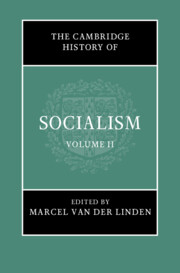Book contents
- The Cambridge History of Socialism
- The Cambridge History of Socialism
- The Cambridge History of Socialism
- Copyright page
- Contents
- Figures
- Maps
- Tables
- Contributors to Volume II
- Abbreviations
- Introduction to Volume II
- Part I Transforming State Power
- Social Democratic Routes in Europe
- Social Democratic Routes in Australia, the Americas, and Asia
- 7 The Australian Labor Party
- 8 Social Democracy in Argentina
- 9 The Partido dos Trabalhadores in Brazil
- 10 A Persistent Whisper: The Social Democratic Idea in US History
- 11 Social Democracy in Japan
- Worldwide Connections
- Southern Trajectories
- Left Socialisms
- Part II Transversal Perspectives
- Index
- References
8 - Social Democracy in Argentina
from Social Democratic Routes in Australia, the Americas, and Asia
Published online by Cambridge University Press: 03 November 2022
- The Cambridge History of Socialism
- The Cambridge History of Socialism
- The Cambridge History of Socialism
- Copyright page
- Contents
- Figures
- Maps
- Tables
- Contributors to Volume II
- Abbreviations
- Introduction to Volume II
- Part I Transforming State Power
- Social Democratic Routes in Europe
- Social Democratic Routes in Australia, the Americas, and Asia
- 7 The Australian Labor Party
- 8 Social Democracy in Argentina
- 9 The Partido dos Trabalhadores in Brazil
- 10 A Persistent Whisper: The Social Democratic Idea in US History
- 11 Social Democracy in Japan
- Worldwide Connections
- Southern Trajectories
- Left Socialisms
- Part II Transversal Perspectives
- Index
- References
Summary
On the winter morning of Sunday, 28 June 1896, over fifty delegates gathered in the main hall of a building owned by a German socialist association in downtown Buenos Aires. On the stage were ‘the red flags of trade unions and political groups; on the side walls, banners with the names of the big men of socialism’. Dozens of militants and sympathizers, among them a few women, occupied the galleries that surrounded the space reserved for the delegates, all of whom were men. After appointing a provisional committee, which approved some formalities and read a series of telegrams from the interior provinces, the delegates approved the reports of the auditing committee and started discussing the draft statutes and programme of a new organization. On the evening of the following day, after cheerfully singing Filippo Turati’s Inno dei Lavoratori, the delegates closed the congress that had officially constituted the Socialist Party of Argentina (hereafter, PS).1
- Type
- Chapter
- Information
- The Cambridge History of Socialism , pp. 194 - 214Publisher: Cambridge University PressPrint publication year: 2022

